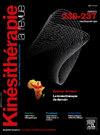Troubles cognitifs, dépression et apathie : du diagnostic à la prise en soins spécifique
Q4 Medicine
引用次数: 0
Abstract
Le vieillissement de la population s’accompagne d’une augmentation significative des troubles cognitifs, touchant plus de 55 millions de personnes dans le monde. Ces troubles sont souvent associés à des comorbidités psychiatriques, notamment la dépression et l’apathie, qui exacerbent le déclin cognitif et fonctionnel des patients. La dépression, fréquente chez les personnes âgées, entretient un lien bidirectionnel avec les troubles cognitifs. De son côté, l’apathie, caractérisée par une perte de motivation et une inertie psychomotrice, constitue la seconde complication psychiatrique majeure chez les patients atteints de la maladie d’Alzheimer. Cette triade — troubles cognitifs, dépression et apathie — forme un cercle vicieux, compliquant la prise en soin des patients, notamment en matière de rééducation. Une approche intégrée, s’appuyant sur des outils de repérage adaptés, est essentielle pour optimiser leur prise en soin. Les démences neurodégénératives et vasculaires présentent des caractéristiques spécifiques qu’il est crucial d’identifier afin d’adapter la rééducation, qui joue un rôle central dans la préservation de l’autonomie et de la qualité de vie des patients. Cet article explore ces interactions complexes et met en lumière les enjeux diagnostiques et thérapeutiques d’une prise en soin spécifique des patients présentant des troubles cognitifs associés à la dépression et à l’apathie.
The aging population is accompanied by a significant increase in cognitive disorders, affecting more than 55 million people worldwide. These disorders are often associated with psychiatric comorbidities, notably depression and apathy, which exacerbate cognitive and functional decline in patients. Depression, common among older adults, has a bidirectional relationship with cognitive disorders. In turn, apathy, characterized by a loss of motivation and psychomotor inertia, is the second major psychiatric complication in patients with Alzheimer's disease. This triad — cognitive disorders, depression, and apathy — creates a vicious cycle, complicating patient care, particularly in rehabilitation. An integrated approach, relying on appropriate screening tools, is essential to optimize patient management. Neurodegenerative and vascular dementias present specific characteristics that must be identified to tailor rehabilitation, which plays a central role in maintaining autonomy and improving patients’ quality of life. This article explores these complex interactions and highlights the diagnostic and therapeutic challenges of specialized care for patients with cognitive disorders associated with depression and apathy.
认知障碍、抑郁和冷漠:从诊断到护理
人口老龄化伴随着认知障碍的显著增加,影响着全球5500多万人。这些障碍通常与精神共病有关,包括抑郁和冷漠,这加剧了患者的认知和功能下降。抑郁症在老年人中很常见,与认知障碍有双向联系。另一方面,冷漠,其特征是失去动力和精神运动惯性,是阿尔茨海默氏症患者的第二大精神并发症。这三者——认知障碍、抑郁和冷漠——形成了一个恶性循环,使病人护理,特别是康复护理复杂化。使用适当的跟踪工具的综合方法对于优化它们的护理至关重要。神经退行性和血管性痴呆具有特定的特征,为了适应康复,识别这些特征至关重要,康复在保持患者的独立性和生活质量方面发挥着核心作用。本文探讨了这些复杂的相互作用,并强调了与抑郁和冷漠相关的认知障碍患者的特定护理的诊断和治疗挑战。世界卫生组织(世卫组织)和世界卫生组织(世卫组织)的一份新报告显示,世界卫生组织(世卫组织)和世界卫生组织(世卫组织)之间存在着巨大的差距,而世界卫生组织(世卫组织)和世界卫生组织(世卫组织)之间存在着巨大的差距。这些障碍通常与精神上的共病有关,特别是抑郁和冷漠,这加剧了患者的认知和功能下降。抑郁,在老年人中很常见,与认知障碍有双向关系。反过来,冷漠,以失去动力和精神运动惯性为特征,是阿尔茨海默氏症患者的第二大精神并发症。这三种疾病——认知障碍、抑郁和冷漠——形成了一个恶性循环,使患者护理复杂化,尤其是在康复领域。一种依赖于适当筛查工具的综合方法对于优化患者管理至关重要。神经退行性和血管性痴呆有必须确定的特定特征,这在保持自主和提高患者的生活质量方面发挥着核心作用。本文探讨了这些复杂的相互作用,并强调了与抑郁和冷漠相关的认知障碍患者的专业护理的诊断和治疗挑战。
本文章由计算机程序翻译,如有差异,请以英文原文为准。
求助全文
约1分钟内获得全文
求助全文
来源期刊

Kinesitherapie
Medicine-Rehabilitation
CiteScore
0.40
自引率
0.00%
发文量
135
期刊介绍:
Kinésithérapie, la revue adresse aux praticiens et aux étudiants qui veulent lire des informations accessibles et utiles. Ce est la première revue francophone paramédicale à être indexée dans une base de données internationale - Cumulative Index to Nursing and Allied Health Literature : CINAHL.
 求助内容:
求助内容: 应助结果提醒方式:
应助结果提醒方式:


